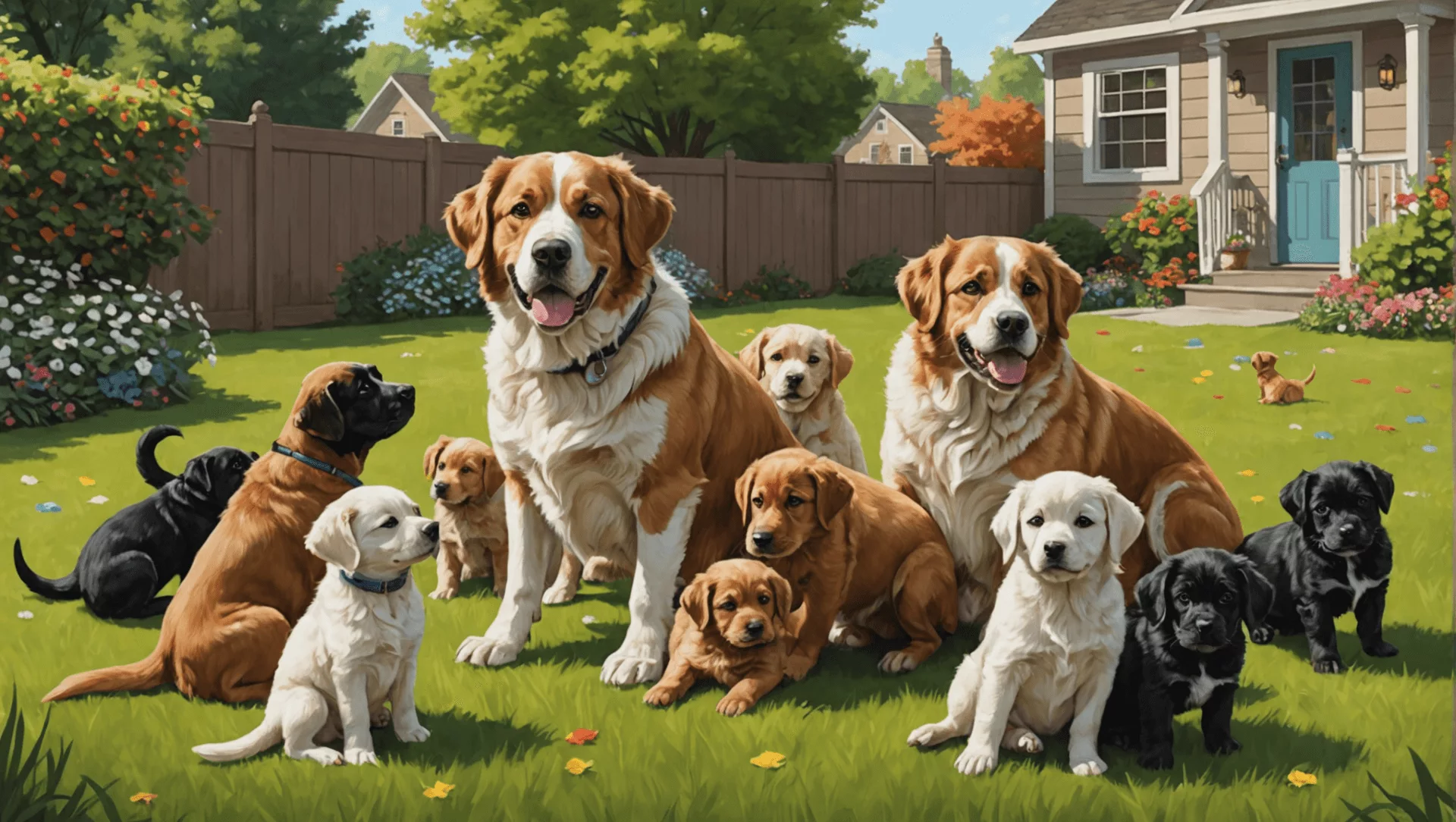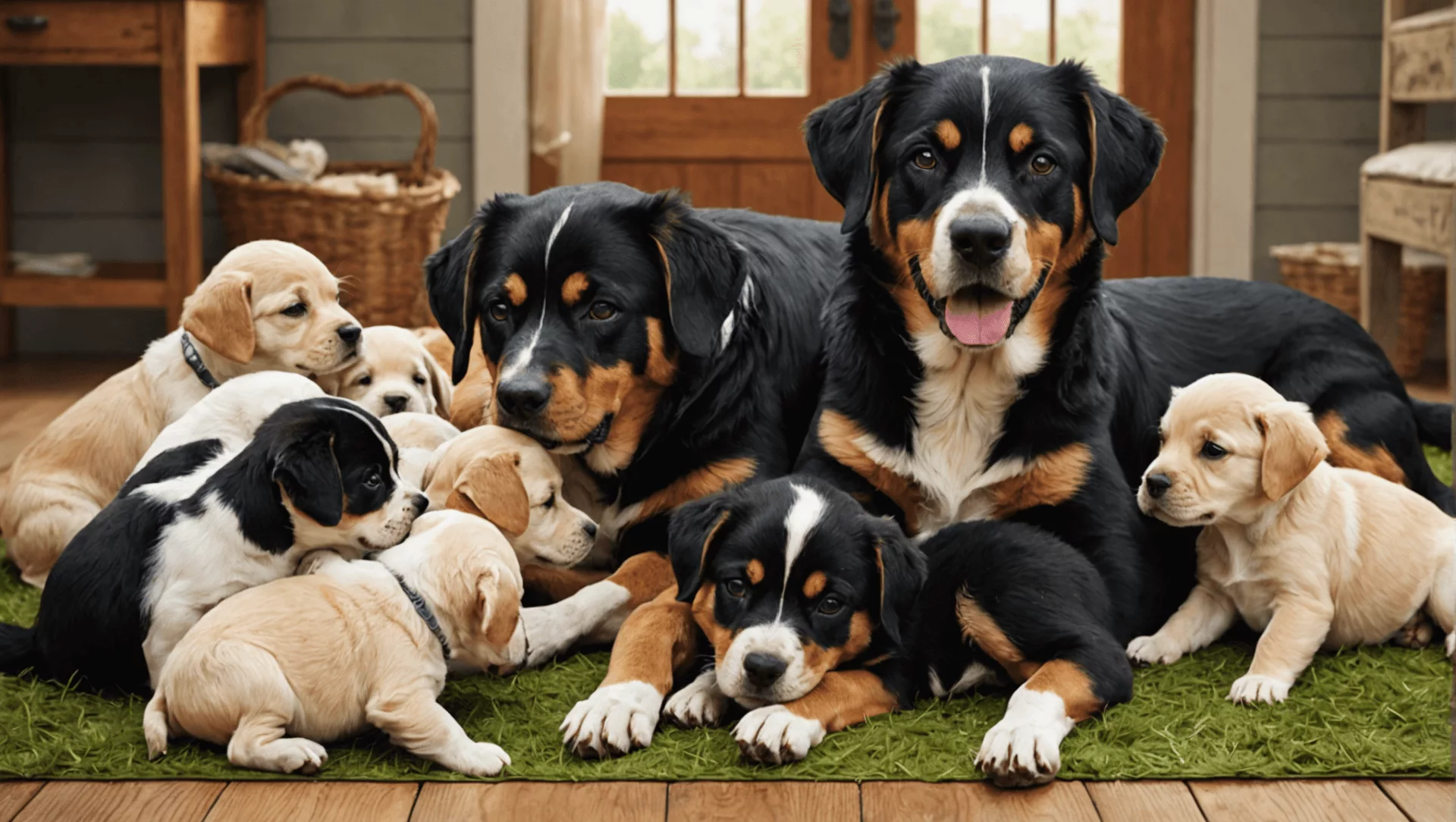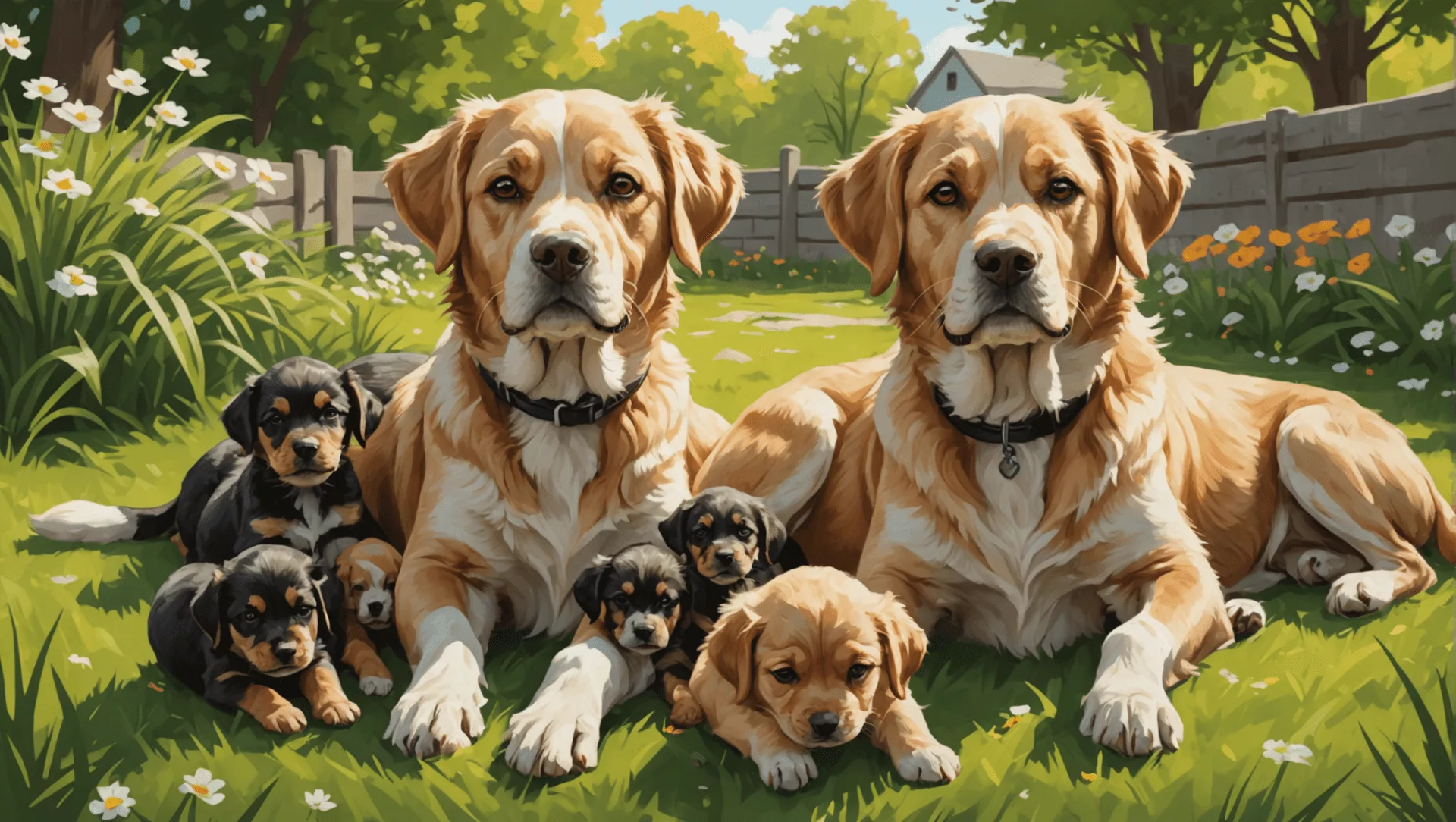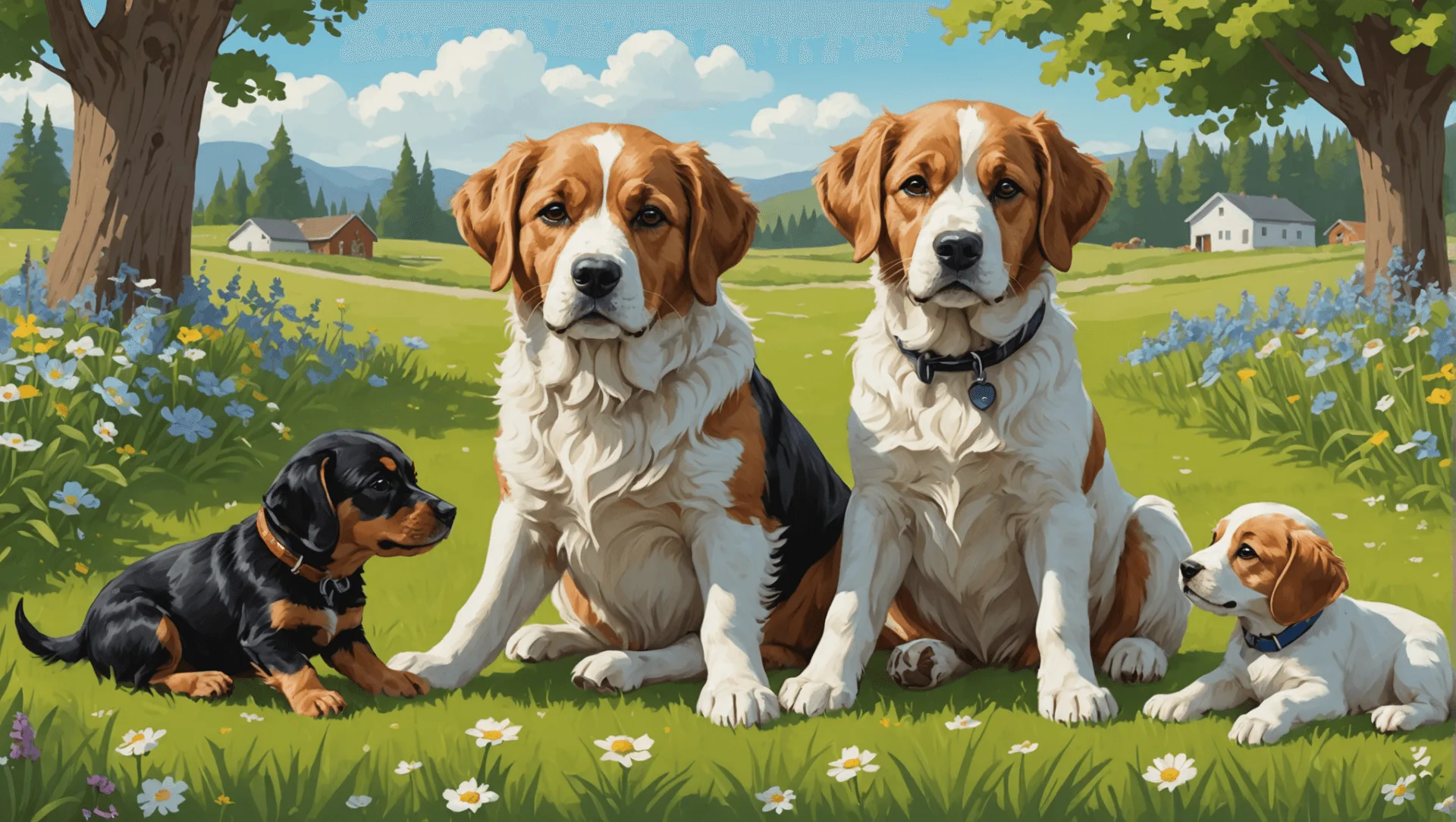Have you ever wondered if dad dogs recognize their puppies? The question, “do dad dogs know their puppies,” dives deep into the amazing world of canine instincts and behaviors. Understanding this bond is crucial for every pet parent, especially if you want to foster a loving environment for your furry family. If you overlook this connection, it might lead to confusion and behavioral issues, making interactions less enjoyable for both you and your pets.
In this article, we’ll explore how male dogs recognize their young ones, the fascinating paternal instincts they exhibit, and the behaviors that show their affection. From the signs of recognition to the importance of socialization, we’ll share tips for nurturing a strong bond between father dogs and their puppies.
Get ready to unlock the secrets of canine family dynamics, and discover how to help your dogs thrive together!
Do Male Dogs Recognize Their Own Puppies?

Male dogs can recognize their puppies mainly through their scent. Dogs have an amazing sense of smell, much stronger than humans. This ability helps them identify familiar smells, including those of their offspring. However, recognition may not be as strong as it is in mother dogs, who have more direct nurturing roles.
Even though male dogs can recognize their puppies, they often show indifferent behavior toward them. This can lead to the impression that they do not recognize their young. Such behavior suggests that their paternal instincts are not as strong as those of females. Understanding this can help pet parents create better environments for their dogs and their puppies. [Quora]
Understanding Canine Recognition: Do Dads Know Their Puppies?
Male dogs may appear indifferent to their puppies. This behavior can mislead people into thinking that they do not recognize their offspring. The indifference often relates to their weaker paternal instincts compared to female dogs.
Some male dogs can display protective behaviors, but they generally lack the nurturing instincts that characterize mother dogs. These instincts help provide care and attention to puppies, crucial during their early weeks of development. [Wisdom]
Factors Influencing How Male Dogs Recognize Their Puppies
Recognition varies among male dogs and is influenced by several factors, including:
- Previous Interactions: Male dogs that spend time with their puppies from birth are more likely to recognize them later.
- Age: Older dogs tend to have a better understanding of their surroundings and their offspring.
- Exposure: Continuous exposure to the puppies helps strengthen this recognition.
These factors combine to shape how male dogs respond to their puppies throughout their lives. [Dogster]
Behavioral Signs of Recognition in Male Dogs
Male dogs may show certain behaviors that indicate recognition of their puppies. Common signs include:
- Sniffing: This behavior helps them identify familiar scents.
- Following: They might follow the puppies around, which shows interest.
However, these behaviors can also stem from curiosity rather than a strong bond. Unlike mother dogs, male dogs often do not display affectionate behaviors toward their puppies. They may treat the puppies more like other dogs than as their own offspring. [PawSafe]
| Recognition Factors | Description |
|---|---|
| Previous Interactions | Time spent with puppies improves recognition. |
| Age | Older dogs may better understand their offspring. |
| Exposure | Continuous exposure strengthens recognition. |
The Role of Paternal Instincts in Dogs

What Are Paternal Instincts and How Do They Develop?
Paternal instincts in dogs refer to behaviors that male dogs may show towards their puppies. Unlike female dogs, male dogs often display less nurturing behavior. This difference is largely due to their instincts as pack animals. Male dogs may not feel the same attachment to their offspring as females do. Their instincts lead them to be more indifferent towards puppies.
However, paternal instincts can develop over time with socialization and interaction. If a male dog spends time with his puppies during the first few weeks after birth, he may show more interest in them later. [Wisdompanel]
The Bond Between a Male Dog and His Puppies
The bond between a male dog and his puppies can vary widely. Some male dogs may be affectionate and protective, while others may not form strong connections unless properly socialized. Interaction can be influenced by the dog’s past experiences and temperament.
Dogs with positive experiences with their puppies often develop a stronger bond. This bond can lead to playful behavior, benefiting puppy development. However, male dogs typically do not exhibit the same nurturing behaviors as their female counterparts. [Akc]
Interaction Patterns: How Father Dogs React to Their Young
Father dogs interact with their puppies in unique ways. While they may play gently with their young, they usually do not provide the same nurturing care that mother dogs do. Instead, male dogs treat their puppies similarly to how they would interact with other adult dogs. This might include playful chasing or social grooming but lacks the maternal instinct found in females.
Male dogs may also show protective behaviors, such as barking at perceived threats, but this varies from dog to dog.
| Behavior Type | Description |
|---|---|
| Playful Interaction | Gentle play with puppies, similar to adult dogs. |
| Protective Behavior | May bark at threats, showcasing a protective instinct. |
| Indifferent Care | Less nurturing than female dogs, may not show affection. |
Key Takeaways
- Male dogs may show less attachment to their puppies compared to females.
- Socialization plays a crucial role in developing paternal instincts.
- Understanding how male dogs interact can foster positive relationships.
How Male Dogs Interact with Their Puppies

Key Behaviors When a Male Dog Is Around His Puppies
When male dogs are near their puppies, their behaviors can differ a lot. Some may show playful and affectionate tendencies, engaging in gentle play and showing curiosity. This interaction is important for the healthy development of the puppies. In contrast, other male dogs may seem more reserved or indifferent, not interacting much at all.
The temperament of the dog greatly affects these behaviors. For instance, a male dog with positive past experiences with puppies is likely to be more active and engaging. On the other hand, a male dog with little experience may not know how to behave around his young. Observing these interactions can provide insights into the male dog’s comfort level and instincts regarding his puppies.
| Behavior | Description |
|---|---|
| Playful Interaction | Engages in gentle play with the puppies |
| Indifference | Shows little interest or interaction with puppies |
The Importance of Socialization in Early Puppyhood
Socialization is vital for puppies during their early weeks. When puppies grow up around their father, they learn essential social skills. These skills help them become well-adjusted adult dogs. Early interactions with a male dog can significantly influence how puppies interact with other dogs and humans later in life.
Puppies who are properly socialized tend to be more confident. They learn to communicate with other dogs through play and body language. A father dog can teach his puppies about boundaries and appropriate behavior. The positive influence of a father dog helps reduce future behavioral issues.
Tips for Encouraging Positive Interaction Between Father and Puppies
Creating a safe and positive environment for interactions is essential. Here are some tips to encourage these interactions:
- Introduce Gradually: Allow the male dog to meet the puppies slowly. This helps reduce stress for both the puppies and the father dog.
- Use Positive Reinforcement: Reward the male dog for calm, friendly behavior. Treats and praise can encourage him to engage positively with his puppies.
- Supervise All Interactions: Always monitor how the father interacts with the puppies. Supervision ensures safety and comfort for everyone involved.
- Create a Comfortable Space: Provide a safe area where the male dog and puppies can interact freely and without distractions.
- Encourage Play: Engage the father dog with toys or activities that motivate him to play with his puppies.
Research Insights Into Canine Recognition

Recent Studies on Dog Recognition of Puppies
Recent research confirms that male dogs can recognize their puppies primarily through their amazing sense of smell. Dogs have around 300 million smell receptors in their noses, allowing them to detect and differentiate scents much better than humans.
Studies show that male dogs can identify their offspring from a distance due to this remarkable olfactory ability. If a male dog spends time with his puppies during the first few weeks of life, he is more likely to recognize them later.
| Aspect | Details |
|---|---|
| Scent | Dogs use scent as the primary means to recognize their young. |
| Socialization | Early interactions significantly improve recognition skills. |
| Auditory Cues | Unique vocalizations, like puppy barks, also aid recognition. |
| Connection Strength | Familiar smells create a strong bond between male dogs and their puppies. |
Evolutionary Factors in Canine Recognitional Abilities
The ability of male dogs to identify their puppies has roots in their evolutionary history. Like their wild ancestors, dogs need to recognize their young for survival. In the wild, recognizing offspring helps protect the pack.
Male wolves, for instance, show protective behaviors towards their young. As domestic dogs evolved, these instincts remained. Recognizing puppies ensures that young dogs receive the care they need to survive.
Understanding the Science Behind Dogs Recognizing Their Young
Understanding how dogs recognize their young combines biology and behavior. Besides smell, visual cues and sounds are also important. Research indicates that male dogs may respond differently to their puppies’ barks based on recognition.
The emotional bond formed during early interactions enhances recognition capabilities. Time spent together solidifies the connection, leading to affectionate behavior.
Experts’ Best Practices

Best Practices for New Puppy Owners Managing Paternal Relationships
New puppy owners should supervise interactions between male dogs and their puppies. This supervision helps build comfort and familiarity. Encouraging gentle interactions can foster positive relationships.
Owners can create a safe space for the father dog to play with his puppies. Engaging the father dog in activities, like light play or training, can enhance their bond. Owners should also be aware of the father dog’s behavior. If he seems anxious or aggressive, it may be best to separate him until he calms down.
Tips for Strengthening the Bond Between a Male Dog and His Puppies
To strengthen the bond, owners can engage in shared activities with both the father dog and his puppies. Simple games, like fetch or gentle tug-of-war, can promote interaction. Providing a calm environment is essential, as it allows the male dog to feel secure while interacting with his puppies.
Additionally, giving the father dog one-on-one time can help reinforce his bond with each puppy. Recognizing the unique personalities of each puppy can also be beneficial. Owners should watch for cues, such as playful behaviors or signs of discomfort, to guide interactions.
| Behavior | Significance | Tips |
|---|---|---|
| Sniffing | Indicates interest and recognition | Allow the dog to sniff the puppies |
| Gentle nuzzling | Shows affection and bonding | Encourage gentle interactions |
| Playful behavior | Promotes social bonds | Engage in games like fetch |
By following these practices, owners can help foster better relationships between male dogs and their puppies, enhancing their family dynamic.
Conclusion
In summary, male dogs can show recognition of their puppies through various behaviors and instincts. These affectionate behaviors often stem from their natural paternal instincts, which play a significant role in how they bond with their young. Factors like socialization and early interactions can also enhance this special connection, making it important for pet owners to foster positive experiences between father dogs and their puppies.
Understanding these dynamics can help us appreciate the amazing ways dogs connect with their families. So, whether you’re a new puppy owner or just a dog lover, keep exploring the fascinating world of canine behavior! Who knows what other surprises your furry friends might have in store?
FAQs
1. Do dad dogs know their puppies?
Typically, male dogs don’t recognize their puppies due to a lack of biological bonding, though scent and sound cues may trigger instinctual behaviors.
2. Can dad dogs show affection towards their puppies?
Some adult males may exhibit affection towards puppies, but it’s usually uncommon and often driven by curiosity rather than paternal instinct.
3. Why don’t male dogs help raise their puppies?
Unlike wild dogs or adult wolves, domestic male dogs rarely harbor paternal instincts, as they don’t play a role in the survival.
4. Do dad dogs ever show aggression toward their puppies?
Aggression toward puppies can occur, especially if the male dog is territorial or agitated, but this behavior varies by individual and is not always present.
5. At what age do puppies recognize their father if at all?
Puppies start to recognize familiar dogs around 5 – 6 weeks of age, but they don’t form a special bond with their father as they do with their mother.

